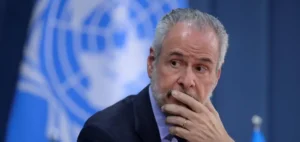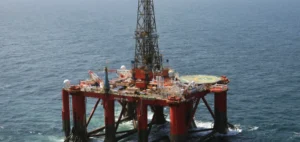The Spanish government announced on Friday the opening of an investigation into the possible entry of Russian oil into its territory via third countries, calling for a common European response to “strengthen the traceability” of fuel imports. “Faced with the slightest suspicion, it is necessary to verify” if “the imported products come from the place indicated or from another country, and if there has been any irregularity,” explained in a message sent to AFP the Minister of Ecological Transition, Teresa Ribera.
“It is this fear” that has prompted Spain to “investigate” the possible arrival on its territory of oil of Russian origin, added the minister, recalling that fuel imports are “in theory accompanied by documents proving their origin.” The European Union banned the import of Russian oil products into its territory on February 5, as part of a new package of sanctions adopted in response to Moscow’s offensive against Ukraine launched in February 2022. But experts and oil industry officials suspect that Russia – which has turned to other markets, such as China and India – continues to export oil to the EU via third countries, where its origin is concealed.
“Russian diesel continues to circulate on the European and Spanish market,” said Thursday the CEO of the Spanish oil giant Repsol, Josu Jon Imaz, calling on the EU authorities to be “firm” on this issue. In its Friday edition, the Spanish daily El Mundo points to the responsibility of Morocco which, according to him, has greatly increased its imports of Russian oil in recent months while beginning to export diesel to Spain.
In Rabat, three parliamentary opposition groups recently called for the establishment of a commission of inquiry into “doubts and suspicions” about the import of Russian diesel by fuel companies, and “a possible resale of this fuel to countries that prohibit its import. This initiative was not successful because it did not have the majority of votes needed to form a commission of inquiry. Questioned last month, the Moroccan government spokesman, Mustapha Baïtas, assured that the share of Russian diesel in Morocco’s imports is 9%, “as has been the case for several years”, without wishing to raise suspicions of a possible resale of this fuel to European countries from Morocco.
“The first elements” communicated by the importers “show that everything is apparently in order and that the products do not come from Russia, but we are vigilant and will follow closely the evolution of the situation to corroborate this definitively”, emphasizes Teresa Ribera.
According to the Ministry, Ms. Ribera will send a letter to Brussels to demand the “immediate start” of a European response to “strengthen the traceability” of oil imported by the EU with the obligation of a certificate at the exit of refineries as at the exit of ports. “It is necessary that this certificate contains all the elements – volume, date, etc.. – ensuring that imports” are not subject to “sanctions”, insists the Ministry, calling for “remain uncompromising in the application of sanctions.






















